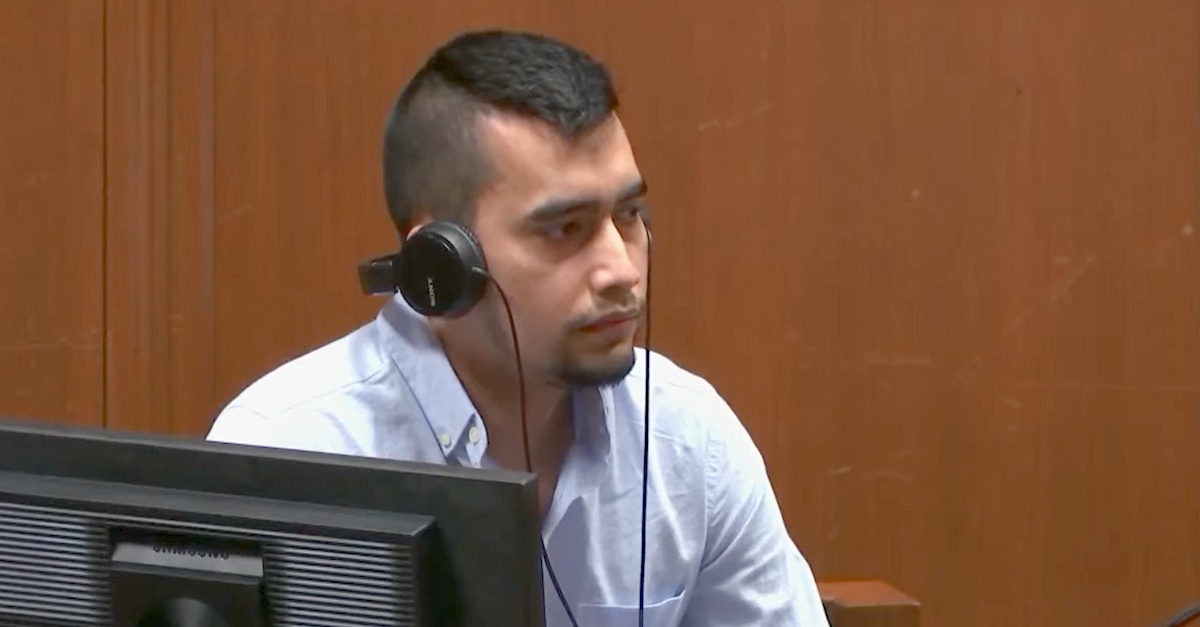
Cristhian Bahena Rivera testifies in his own defense.
Cristhian Bahena Rivera, the defendant charged with murdering Iowa college student Mollie Tibbetts, 20, took the stand in his own defense Wednesday morning and testified that he lied to investigators under duress about what he claims really happened the day Tibbetts died.
Testifying through an interpreter, the defendant said his two last names originate from his father and his mother — but that it would be customary for him to be called by only the last name Bahena.
Bahena testified that two unknown men appeared in his living room with a knife and a gun the day Tibbetts was killed, threatened the lives of his daughter and his ex-girlfriend, and told him to drive to Brooklyn, Iowa, while vaguely referencing a person running. He said the men told him to pass Tibbetts several times and that one eventually got out of the car, walked toward town, and apparently attacked Tibbetts while he waited in his car with the other unknown man. He said he did not witness the attack but that the man returned, told him to drive a few hundreds meters, again exited the vehicle, and put something in his trunk while he remained inside. He said the men then ordered him to the location where they deposited Tibbetts’ body. It was only then that he realized a body was in his trunk.
Bahena said one of the men uttered the phrase “c’mon, Jack,” but his defense attorney clarified that he was not claiming Dalton Jack, Tibbetts’ boyfriend, was one of the two men his car. The defense has suggested Jack might have been involved with the killing because Jack had slept with another woman. Jack testified that he was not involved with the killing.
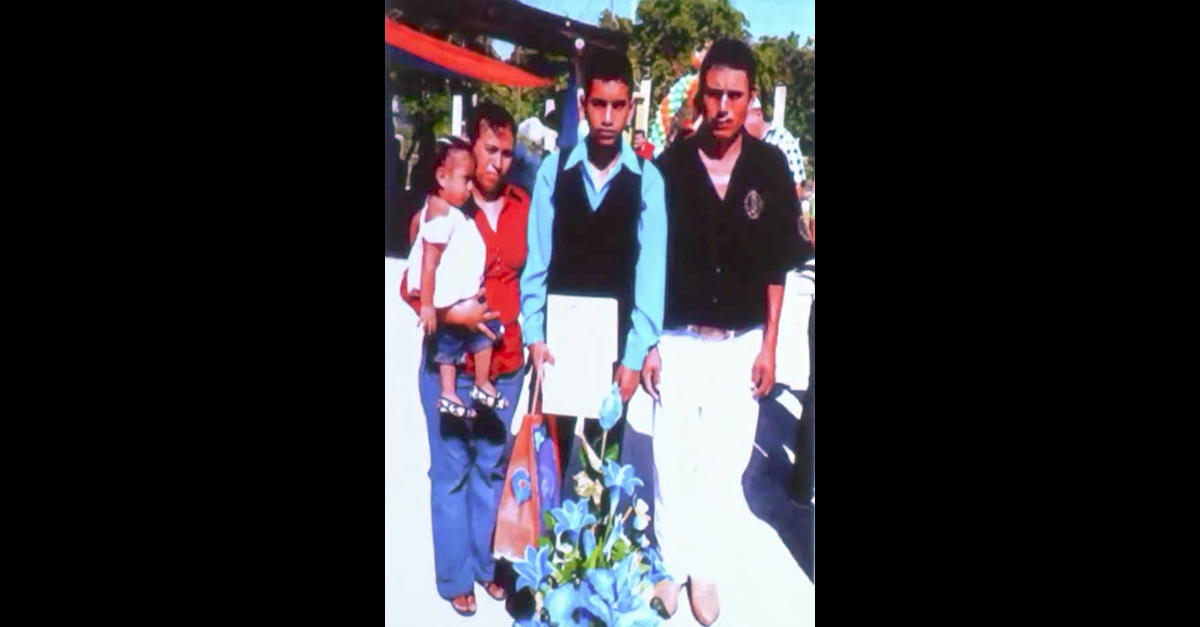
Cristhian Bahena Rivera is seen in a defense evidence photo with his parents and sister in Mexico. The image was taken when Bahena graduated from the local school.
Bahena said he was born in Guerrero, Mexico, in the south part of the country. Guerrero is due south of Mexico City. He said he has two younger sisters. His mother is a housewife and his father works in the fields. His father earned about $1,500 pesos a week, the equivalent of about $75 U.S. dollars.
Bahena said he graduated from a rudimentary three-room school after nine to 10 years of studies. He described the school as not “high tech.”
He said his family’s home was “built out of dirt and cement and the roof is tile.” He said his kitchen contained a refrigerator and a stove. The rooms “were divided by curtains.”
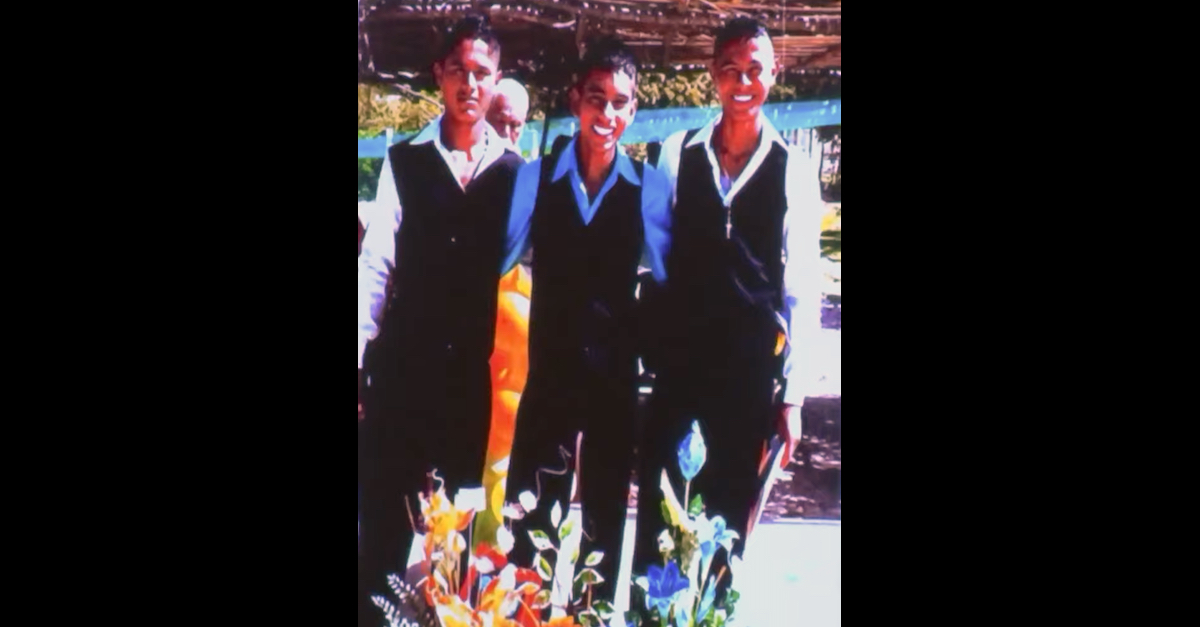
Cristhian Bahena Rivera (center) is flanked by his cousins in a photo presented by the defense.
Bahena said he hired a “coyote” to help him cross the border into the United States at age 17. He entered through Texas by crossing a river on an inflatable raft with nine or 10 other people and evaded border patrol officers. He stayed at a hotel in Houston with the other people with whom he crossed. He said everyone slept on a hotel floor and eventually took a car to Iowa. There, he met two uncles who were already in the United States. He settled with family and obtained work within two days through an uncle at a dairy farm in Blairstown, Iowa, where he said he was not required to show citizenship documents and was paid by check.
After two and a half years, he said he went to work for Yarrabee Farms to earn more money. There, he worked 12 hours a day and was required to work 12 out of 14 days. He earned $1,500 and $1,600 every two weeks and was paid in cash.
Bahena said Yarrabee Farms required him to submit official documents but that he was given time to procure said documents. He eventually said he submitted documents under a “new name” but that people at the farm called him Cristhian.
He said he would send $700 to $800 a month to Mexico because it is customary for the oldest male child in a Mexican family to provide.
Bahena testified that he met a woman at a birthday party who he eventually dated. That woman, Iris Gamboa, testified previously that she and Bahena had a baby. Bahena said he dated Gamboa for about four years.
He said he didn’t dislike “white people” but spent most of his time with local Hispanics.
“You’re here illegally, is that right?” asked defense attorney Jennifer Frese.
“Yes,” he answered.
Bahena said he tried to avoid all contact with law enforcement. When authorities came to ask him about Mollie Tibbetts, he feared at first that it was an immigration raid.
FRESE: Did you tell law enforcement the truth that night?
BAHENA: Not all.
Q: Mollie Tibbetts was in the trunk of your car, isn’t that right?
A: Yes.
Q: And you did not tell them what really happened, isn’t that right?
A: Correct.
Bahena said that the day Tibbetts disappeared, he returned home from work and planned to clean out his car because he had a date with a girl planned for the next day. He went to his uncle’s house in Brooklyn, Iowa, to pick up a vacuum cleaner. He said his uncle was not home but that he picked up the vacuum, anyway. He said he returned to his house, went inside, and took a shower at around 6:00 or 6:30 p.m. because the sun was “too strong” to continue working outside.
When he got out of the bathroom, he said “two people” were in his living room “with sweaters and their faces covered.”
“It was dark clothing,” Bahena said.
The defendant testified “one of them was bigger and a little bit fatter and one of them was about my stature and a little big stronger, burly.” He said “the bigger one” had a gun; the “smaller one” had a knife.
“I don’t know a lot about guns; I can just say that it was black,” Bahena said. “It was a medium sized knife; camouflage color.”
The men told Bahena he “shouldn’t do anything stupid” and that “everything was going to be okay,” he claimed.
“We were there for a long while . . . they were just there whispering; we were there for a long while,” he testified.
Bahena said he complied with their instructions and did not argue with the men. He said the bigger man got into the back seat and that the smaller man — the one with the knife — sat in the front passenger seat. He said the men told him to “drive straight” and that the two men talked about “someone running.”
He said the men spoke English and that he didn’t understand much of the conversation.
Bahena testified that he drove the men to Brooklyn, Iowa by taking a “back way” into town.
He said he saw “a person jogging.” He didn’t know the person, but he said he now realizes it was Mollie Tibbetts.
Tibbetts was jogging away from town, Bahena said.
“We just continued driving, and then they asked me to turn around,” he said in response to questions from his attorney. “We went back out through the same way we came in. We drove straight on the same route. And then they asked me to turn back.”
The men were trying to “kneel down” or “crouch down as much as they could in the seats.”
Bahena admitted that his vehicle was caught on camera by a neighbor’s surveillance video.
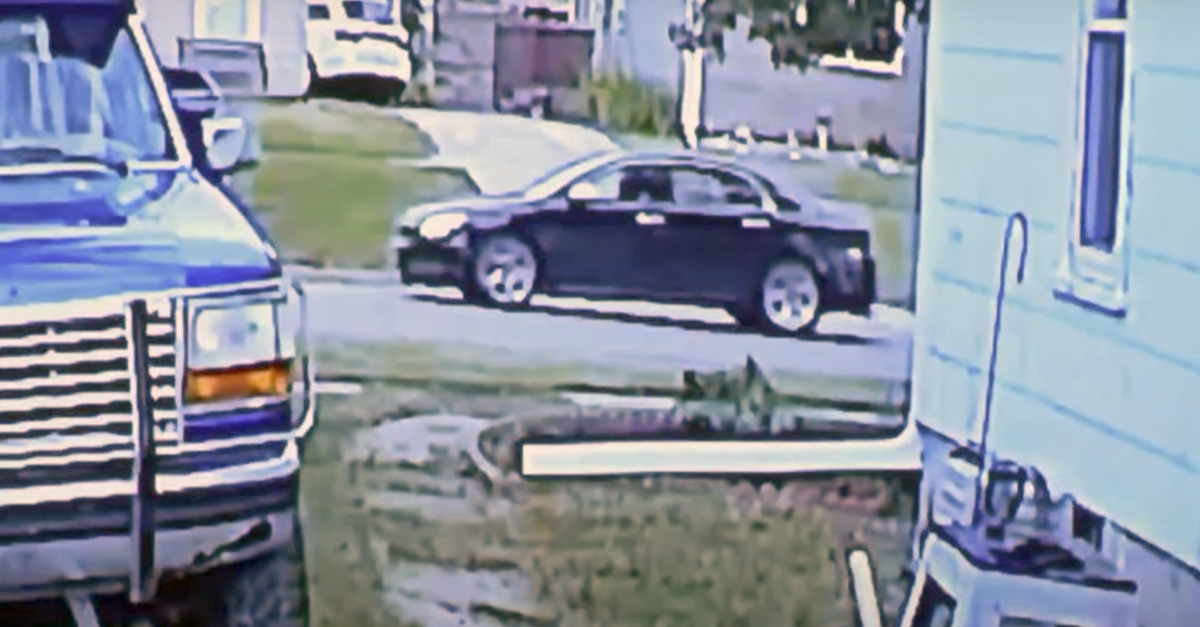
“That’s my car,” he said with reference to pictures of his vehicle caught by that camera.
He then testified that he passed Tibbetts “at the direction” of the men in his vehicle about “three or four” times.
Bahena said he again passed Tibbetts on 385th Avenue near 200th Street as he was leaving town and while Tibbetts was running back toward Brooklyn. He testified that the men in his car told him to turn around.
The judge then called a 10-minute break.
When testimony resumed, Bahena said the “person that was next to” him, the “man with the knife,” told him to stop.
Bahena said that same man — the one in the front seat with the knife — got out of the car and started walking toward town. He said the man was gone for about 10 or 12 minutes.
The man in the back of the car was nervous, Bahena said, but mostly remained quiet. As time went on, the man started whispering.
“C’mon, Jack,” the man allegedly whispered.
His defense attorney cut in for clarification.
FRESE: “Now, sir, you’ve heard Mr. Frese and I at least insinuate that Dalton Jack could have been involved in this. You’ve heard the trial, correct?”
BAHENA: “Yes.”
Q: “Are you telling this jury that Dalton Jack was one of those people?”
A: “No.”
Q: “Do you know who either of the people were that were in that car with you?”
A: “No.”
Dalton Jack was Mollie Tibbetts’ boyfriend. Tibbetts and Jack had argued over his infidelity, the defense has suggested, shortly before Tibbetts disappeared.
After about 12 minutes, Bahena said the man with the knife came back to the car. The men told him to continue driving back toward town but stopped short of Brookyn after he’d driven perhaps 300 meters.
He said he was ordered to hand the men his keys. The man in the front got out of his car, followed by the man in the back. He then said he heard the men opening his trunk.
“I just heard a movement in the car, and then the trunk closed,” Bahena testified.
The men reentered the vehicle and ordered him to turn around, he said.
“They asked me to continue driving and go towards the gravel road,” Bahena testified. “I just remembered driving fast . . . for several miles . . . we got to . . . a road that was paved. They asked me to cross that . . . I don’t remember the address; all I remember is that it was straight.”
After five to eight minutes, he said the men ordered him to stop at a white house. He was told to turn around at that house and to double back to the corn field where Tibbetts’ body was found.
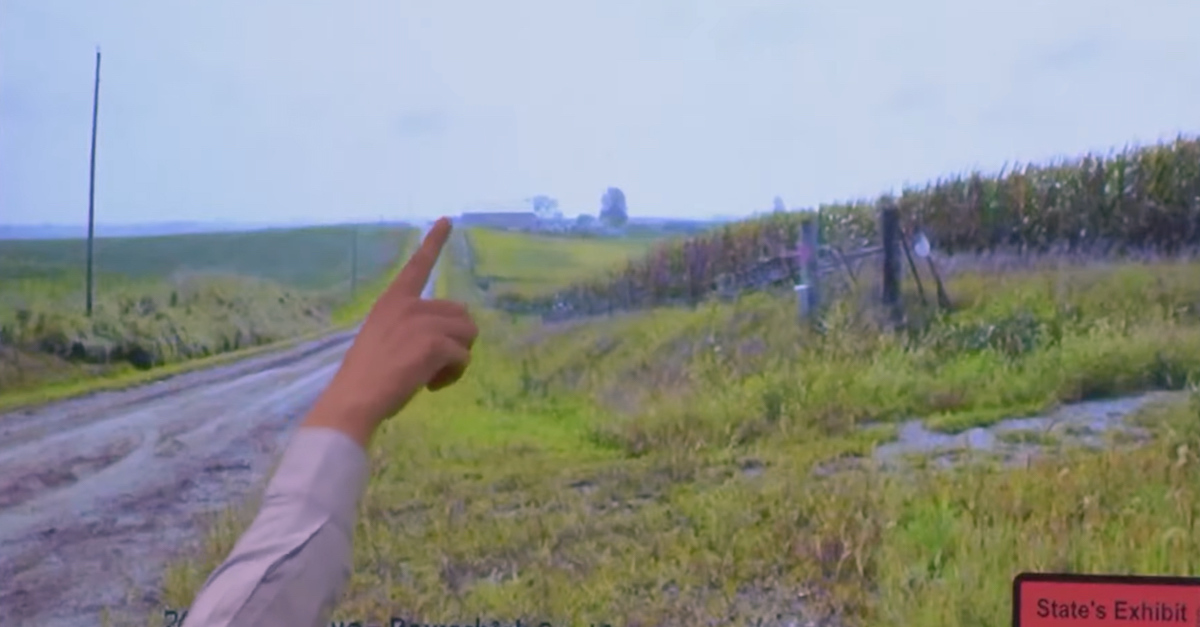
Cristhian Bahena Rivera points to the location where he says the men in his car ordered him to turn around. The image, a state evidence photo, was taken from the area where Mollie Tibbetts’ body was found.
He said he had never been to that location before.
“They only asked me to turn the car off . . . and they start getting out of the car . . . yes, they took my keys and my phone . . . one of them tells me not to say anything about what had happened . . . that they knew Iris, that they knew my daughter . . . that if I said something, they would take care of them . . . they told me just to wait a few minutes and to leave . . . I got out of the car because I didn’t have my keys. Obviously, I there was something in the trunk . . . because previous I had felt when they had placed something in the trunk.”
FRESE: Did you look in the trunk?
BAHENA: Yes.
Q: What did you see?
A: A body.
Q: Was that the body of Mollie Tibbetts?
A: Yes.
Q: At that time, did it look like she was alive?
A: At the beginning, I saw, like, a little bit of movement, but then after, there was no movement.
Q: Did she have injuries to her body?
A: I did not look.
Bahena said he stayed at the scene for a couple of minutes and took the body out of his car. He said he was “scared” to call the police because it wouldn’t be “seen good or “wouldn’t be right.”
He said there were no signs Tibbetts’ life could be saved. He described her body as “very heavy” as he picked it up out of the trunk.
Tibbetts was dressed with “sports clothing.”
BAHENA: “I picked her up and then I put her in the corn field.”
FRESE: Did you cover her with corn?
A: Yes.
Q: Why did you do that?
A: Because I didn’t want to leave her — I didn’t want her to be too exposed to the sun.
Q: When you left her, was she clothed?
A: I left her exactly like she was in the trunk.
Q: At that time, do you recall her having any shorts on?
A: Yes.
Q: What about her sports bra; did it cover her chest?
A: Everything. She had everything on. There was only one shoe that was off.
Q: What did you do after you laid her in the corn?
A: I tried — I tried to go home.
Bahena said he struggled to find his way home but used his phone to find directions.
He said Tibbetts’ phone, fitbit, and ear buds were in his trunk along with his phone and his keys. He said he left Tibbetts’ belongings “on the side of the road.”
He kept his version of events a secret for more than a month, he said.
He said he feared telling anyone the story because he would be implicated in some way and because he feared his daughter would be attacked.
Bahena said the two men used his ex-girlfriend’s name, suggesting to him that they meant business.
Bahena said a man named Ulysses, a cousin of his ex-girlfriend, was not in the car, but was in his social circle and knew other white people.
The testimony then turned toward Bahena’s police interview. He said the police told him they had evidence that his phone was with Tibbetts’ phone, that Tibbetts’ hair was in his car, and that he felt pressured to agree with the information the authorities claimed to have.
FRESE: “At some point, you said that you blacked out; is that right?”
BAHENA: “Yes.”
Q: Was that your idea?
A: No. They said it first.
Q: And, specifically, was there a suggestion made that you might be crazy?
[An objection was overruled.]
A: Something like that. Something like — that sometimes people can be sick and they can forget things.
Q: Now, sir, did you intend to tell these men the truth about what really happened that night?
A: No.
Q: Why not?
A: Because, in my mind, I had my daughter.
Bahena then testified that he was extremely tired and led police to the location of Tibbetts’ body because the authorities told him to put himself in the shoes of Tibbetts’ family.
Prosecutors attacked the story.
“These two men just disappeared?” a prosecutor asked after spending considerable time recapping the story.
“That’s right,” Bahena replied.
“You concealed her body, is that correct?” the prosecutor later asked.
“You could say that,” Bahena replied.
Bahena said on cross examination that he had no clue who the men were.
Prosecutors then challenged Bahena’s original admission to the police that he confronted Tibbetts on the side of the road and “blacked out” the details from there.
Bahena had never previously suggested the existence of the other men. He said his door was unlocked.
He said he had no connection to the two unknown men he claimed were the true killers.
He admitted he could have told the officers that he was worried about his daughter’s safety — but didn’t.
“I told them that before giving them any information, I needed to know that my daughter and her mother were safe,” he testified.
“And you were assured they were safe?” the prosecutor asked.
“They didn’t tell me anything,” Bahena responded.
The prosecutor then railed Bahena for lying to the police through the duration of his contact with law enforcement.
The testimony was ongoing at the time of this report, but then halted for a lunch break.
[images via the Law&Crime Network]